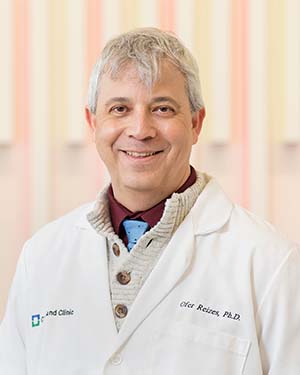Research News
06/10/2024
New findings remove roadblock to targeted treatment for chemo-resistant ovarian cancer
Discovering a new way a protein behaves in ovarian cancer led to new research, potential treatments.

Cleveland Clinic researchers are investigating a novel treatment strategy for ovarian cancer after discovering a new location for a protein that promotes chemoresistance and aggressive cancer stem cell growth.
The findings, published in Molecular Cancer, hold promise for new treatments that target the protein CD55, difficult to target because of its protective role in the immune system and its location on the cell surface. Ofer Reizes, PhD and his lab previously identified the protein CD55 as a primary agent in ovarian cancer chemoresistance. They also found CD55 underlies tumor recurrence and metastasis in multiple other cancers. Previous studies indicated CD55 may provide a therapeutic for ovarian cancer. The group's next challenge was to determine how a treatment would work.
The breakthrough came as Drs. Rashmi Bharti and Goutam Dey, postdoctoral fellows in Dr. Reizes' lab, found that CD55 had migrated into the cell nucleus from the surface. The lab started examining cells and tissues from patient samples by working with Chad Michener, MD and Roberto Vargas, MD, oncologists specializing in women's health at Cleveland Clinic. A subset of patient tumors showed the same thing: CD55 protein was inside the nucleus of the cancer cells. Once inside the nucleus, the protein was setting off a response that makes the cancer more aggressive.
"Cancer cells can do unusual things — co-opt existing pathways and create new pathways we didn't know were possible," Dr. Reizes explains. "Once we discovered this new pathway, we wanted to first see if we could find a way to block CD55 from moving into the nucleus. And then, once we prevented that move from occurring, we needed to determine whether we could halt the cancer's progression."
The study showed blocking CD55's pathway from the cell surface to the nucleus disrupted cancer growth and lessened chemoresistance.
"When Dr. Bharti in my lab came to me after she first observed CD55 in the cell nucleus, I was doubtful of the significance. We're scientists, we're trained to be skeptics. But I chose to trust her inclination that this was worthy of further study," Dr. Reizes recalls. "Ultimately, we made a critical discovery. And it never would have happened without my lab member being empowered to pursue her own investigations. Seeing the problem from every angle is vital to our success."
Combatting chemoresistance: a path forward
Ovarian cancer is the second most common gynecologic cancer in the U.S. and the most common cause of death. The disease's vague symptoms often lead to late-stage diagnosis, complicating treatment. Gynecologic cancer patients commonly see the cancer recur and develop resistance to chemotherapy. Ovarian cancer cells — especially cancer stem cells — can survive chemotherapy drugs. Dr. Reizes' lab investigates chemoresistance biomarkers and targeted therapies.
Dr. Vargas explains ovarian cancer treatment can be reactive: waiting for treatments to fail before trying something new. This study's findings afford doctors and patients the choice to avoid a chemotherapy regime if diagnostics show that CD55 is already present in the cell nucleus, indicating chemoresistance.
"These newly identified markers could allow us to track these cancers as they change in real-time," Dr. Vargas explains. "How amazing would it be to adapt our treatments as a tumor is evolving, instead of waiting for negative results months later? These approaches, thanks to Dr. Reizes' findings, may finally allow us to remain a step ahead."
What's next
From Drs. Bharti and Dey's initial observation in his lab to developing a treatment, Dr. Reizes keeps coming back to one common theme - collaboration. The study's authors come from across Cleveland Clinic departments, including Inflammation and Immunity and the Center for Immunotherapy and Precision Immuno-Oncology at the Lerner Research Institute, and the department of Gynecologic Oncology at the Obstetrics and Gynecology Institute.
Dr. Reizes' lab is currently working with Cleveland Clinic Innovations to develop a treatment to block CD55's pathway to the nucleus and overcome its ability to trigger chemoresistance. The research team saw evidence that the CD55 protein operates in a similar way in other difficult to treat cancers, like triple-negative breast cancer, Dr. Reizes says.
Featured Experts
News Category
Related News
Research areas
Want To Support Ground-Breaking Research at Cleveland Clinic?
Discover how you can help Cleveland Clinic save lives and continue to lead the transformation of healthcare.
Give to Cleveland Clinic